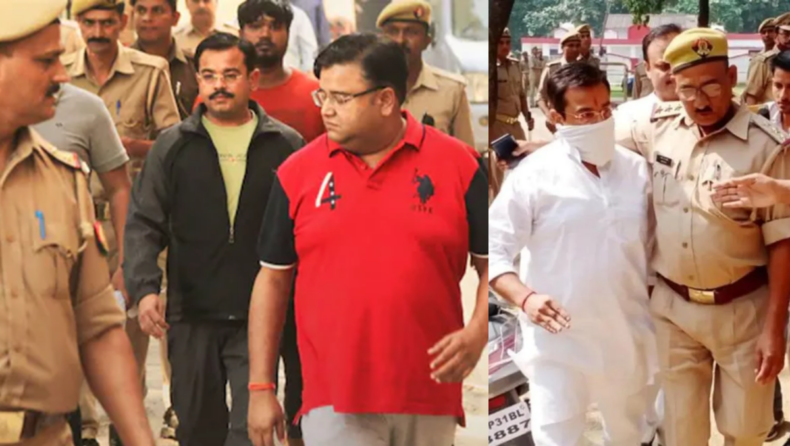According to reports, the Supreme Court of India on Monday, April 18, revoked the bail granted by the Allahabad High Court to Ashish Mishra, son of Union minister Ajay Mishra, in the Lakhimpur Kheri violence case and ordered him to surrender within a week.
A special bench consisting of Chief Justice NV Ramana and Justices Surya Kant and Hima Kohli found that the High Court had taken into account “irrelevant elements” and given “additional weightage” to the contents of the First Information Report and that the High Court had erred in its judgment (FIR).

Ashish Mishra (in black) outside a court
After considering all of the relevant circumstances, including the fact that the victims were not given a full chance to be heard, the Supreme Court remanded the bail application for a further determination on merits.
It was Justice Surya Kant who read the operative section of this decision and stated that “the judgment cannot be supported and needs to be set aside” because of the denial of victims’ right to be heard and “the ripping rush” displayed by the High Court in issuing the bail.
In addition, the bench stated that it was not essential to point out that the accused’s bail application should not be heard by the same judge since this matter should be left to the discretion of the Chief Justice of the Supreme Court.
On April 4, the Supreme Court deferred its decision on a petition filed by farmers requesting Mishra’s bail to be revoked. On February 10, a single-judge panel of the High Court granted Mishra bail after he had been held in detention for four months.
As part of its hearing on Mishra’s release, the Supreme Court expressed concern with the High Court’s decision to give him bail, stating that superfluous information such as the postmortem report and type of the wounds should not have been discussed at this time because the trial had not yet begun.
However, while reserving its decision on a farmer’s petition seeking the cancellation of Ashish’s bail, it also expressed strong concern about the state government’s failure to appeal against the high court’s decision as suggested by the apex court-appointed SIT, noting that
“this is not the kind of case where you have to wait for years.”
“How can a court become involved in a postmortem report, and so on? ”
We are hearing a bail issue, and we do not want to keep it going any longer than it has to be done. It was stated by the bench that “getting into merits and wounds and so forth is superfluous when it comes to the matter of bail.”
On March 16, the Supreme Court issued a request for replies from the Uttar Pradesh government and Ashish Mishra in response to a petition contesting the bail that had been granted to him.
It had also asked the state government to secure the security of witnesses after a lawyer representing farmers brought attention to the attack on a crucial witness on March 10 in front of the court.
Last year, on October 3, violence occurred in Lakhimpur Kheri when farmers demonstrated against the arrival of Uttar Pradesh Deputy Chief Minister Keshav Prasad Maurya to the region. Eight individuals were slain in the ensuing melee, which left eight people dead overall.
According to the FIR filed by the Uttar Pradesh Police, four farmers were killed when an SUV in which Ashish Mishra was sat mowed them down. Following the event, the driver and two BJP volunteers were allegedly lynched by enraged farmers, according to local media.
Additionally, a reporter was killed amid the violence that sparked indignation among opposition parties and farmer organizations who were campaigning against the Union government’s now-repealed agricultural reform legislation.
Author : Tharun Pranav
Published By: Sachin Sonawane













